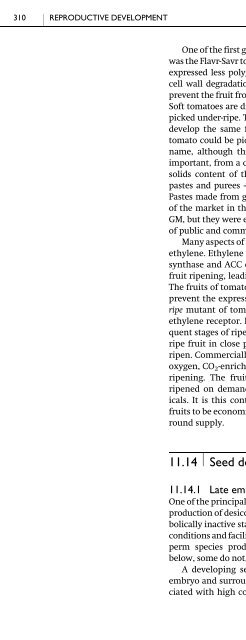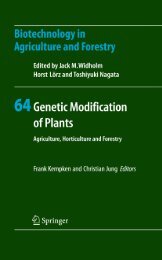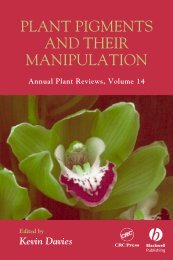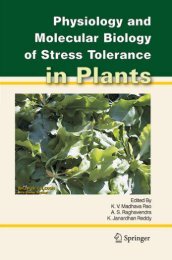- Page 2:
This page intentionally left blank
- Page 8:
The Physiology of Flowering PlantsF
- Page 12:
ContentsPrefacepage ixChapter 1 Int
- Page 16:
CONTENTSVIIChapter 10 Photomorphoge
- Page 20:
PrefaceThe history of this book dat
- Page 24:
Chapter 1Introduction1.1 Appreciati
- Page 28:
MOLECULAR BIOLOGY AND PLANT PHYSIOL
- Page 32:
OUTLINE OF THE TEXT 5all organisms
- Page 36:
Part INutrition and transport
- Page 42:
10 FLOW OF ENERGY AND CARBON THROUG
- Page 46:
12 FLOW OF ENERGY AND CARBON THROUG
- Page 50:
14 FLOW OF ENERGY AND CARBON THROUG
- Page 54:
16 FLOW OF ENERGY AND CARBON THROUG
- Page 58:
18 FLOW OF ENERGY AND CARBON THROUG
- Page 62:
20 FLOW OF ENERGY AND CARBON THROUG
- Page 68:
THE FIXATION OF CARBON DIOXIDE 23Fi
- Page 72:
THE FIXATION OF CARBON DIOXIDE 25Fi
- Page 76:
THE FIXATION OF CARBON DIOXIDE 27Fi
- Page 80:
THE FIXATION OF CARBON DIOXIDE 29va
- Page 84:
LIMITING FACTORS FOR PHOTOSYNTHESIS
- Page 88:
THE EFFICIENCY OF ENERGY CONVERSION
- Page 92:
THE EFFICIENCY OF ENERGY CONVERSION
- Page 96:
PHOTOSYNTHESIS AND THE INCREASE IN
- Page 100:
RESPIRATION: THE OXIDATIVE BREAKDOW
- Page 104:
RESPIRATION: THE OXIDATIVE BREAKDOW
- Page 108:
RESPIRATION: THE OXIDATIVE BREAKDOW
- Page 112:
RESPIRATION: THE OXIDATIVE BREAKDOW
- Page 116:
TERMINAL OXIDATION AND OXIDATIVE PH
- Page 120:
ANAEROBIC RESPIRATION 49Table 2.3 T
- Page 124:
ANAEROBIC RESPIRATION 51grass Echin
- Page 128:
RESPIRATION AND PLANT ACTIVITY 53of
- Page 132:
higher rate of ATP synthesis. The r
- Page 136:
RESPIRATION AND PLANT ACTIVITY 57he
- Page 140:
D. D. Lefebvre & D.B. Layzell. Harl
- Page 144:
WATER POTENTIALS OF PLANT CELLS AND
- Page 148:
WATER POTENTIALS OF PLANT CELLS AND
- Page 152:
WATER POTENTIALS OF PLANT CELLS AND
- Page 156:
WATER POTENTIALS OF PLANT CELLS AND
- Page 160:
WATER RELATIONS OF WHOLE PLANTS AND
- Page 164:
lumina of these cells are blocked w
- Page 168:
WATER RELATIONS OF WHOLE PLANTS AND
- Page 172:
WATER RELATIONS OF WHOLE PLANTS AND
- Page 176:
WATER RELATIONS OF WHOLE PLANTS AND
- Page 180:
atmosphere is very humid and water
- Page 184:
WATER RELATIONS OF WHOLE PLANTS AND
- Page 188:
flow. How is this to be reconciled
- Page 192:
THE TRANSPORT OF SOLUTES IN THE XYL
- Page 196:
WATER UPTAKE AND LOSS 87When a soil
- Page 200:
WATER UPTAKE AND LOSS 89Fig:3:12 Th
- Page 204:
WATER UPTAKE AND LOSS 91excluding s
- Page 208:
gives the ‘bloom’ to glaucous l
- Page 212:
WATER CONSERVATION 95much slower wa
- Page 216:
WATER CONSERVATION 97different syst
- Page 220:
Huber, B. (1956). Die Gefäßleitun
- Page 224:
ESSENTIAL ELEMENTS 101pollution of
- Page 228:
used as drugs, e.g. morphine, nicot
- Page 232:
ESSENTIAL ELEMENTS 105oxidoreductio
- Page 236:
ION UPTAKE AND TRANSPORT IN THE PLA
- Page 240:
ION UPTAKE AND TRANSPORT IN THE PLA
- Page 244:
the argument lies in extrapolating
- Page 248:
sp. and Valonia sp. One Nitella cel
- Page 252:
ION UPTAKE AND TRANSPORT IN THE PLA
- Page 256:
ION UPTAKE AND TRANSPORT IN THE PLA
- Page 260:
ION UPTAKE AND TRANSPORT IN THE PLA
- Page 264:
ION UPTAKE AND TRANSPORT IN THE PLA
- Page 268:
NITROGEN ASSIMILATION, FIXATION AND
- Page 272:
NITROGEN ASSIMILATION, FIXATION AND
- Page 276:
NITROGEN ASSIMILATION, FIXATION AND
- Page 280:
In natural habitats, the elements a
- Page 284:
REFERENCES 131Brown, P. H., Bellalo
- Page 288:
Chapter 5Translocation of organicco
- Page 292:
PHLOEM AS THE CHANNEL FOR ORGANIC T
- Page 296:
PHLOEM AS THE CHANNEL FOR ORGANIC T
- Page 300:
THE RATE AND DIRECTION OF TRANSLOCA
- Page 304:
THE RATE AND DIRECTION OF TRANSLOCA
- Page 308:
PHLOEM LOADING AND UNLOADING 143Fig
- Page 312:
PHLOEM LOADING AND UNLOADING 145Apo
- Page 316:
PARTITIONING OF TRANSLOCATE BETWEEN
- Page 320:
THE MECHANISM OF PHLOEM TRANSLOCATI
- Page 324:
The dimensions of transport channel
- Page 328:
THE MECHANISM OF PHLOEM TRANSLOCATI
- Page 332:
THE MECHANISM OF PHLOEM TRANSLOCATI
- Page 336:
REFERENCES 157ReferencesBalachandar
- Page 344:
Chapter 6Growth as a quantitativepr
- Page 348:
GROWTH, DEVELOPMENT AND DIFFERENTIA
- Page 352:
CONDITIONS NECESSARY FOR GROWTH 165
- Page 356:
GROWTH RATES 167Fig: 6:1 The effect
- Page 360:
GROWTH RATES 169generally high rate
- Page 364:
GROWTH RATES 171Area of leaf surfac
- Page 368:
GROWTH RATES 173The smooth growth c
- Page 372:
GROWTH RATES 17524-hour cycle. The
- Page 376:
Chapter 7Plant growth hormones7.1 I
- Page 380:
PLANT GROWTH HORMONES 179The concen
- Page 384:
PLANT GROWTH HORMONES 181system pro
- Page 388:
PLANT GROWTH HORMONES 183growth-pro
- Page 392:
PLANT GROWTH HORMONES 185traditiona
- Page 396:
PLANT GROWTH HORMONES 187plants. Mu
- Page 400:
PLANT GROWTH HORMONES 189molecules
- Page 404:
DETECTION AND QUANTIFICATION OF HOR
- Page 408:
purified hormone. Figure 7.7 shows
- Page 412:
HOW DO PLANT HORMONES CAUSE RESPONS
- Page 416:
HOW DO PLANT HORMONES CAUSE RESPONS
- Page 420:
HOW DO PLANT HORMONES CAUSE RESPONS
- Page 424:
HOW DO PLANT HORMONES CAUSE RESPONS
- Page 428:
REFERENCES 203Lindsey, K. Plant pep
- Page 432:
Chapter 8Cell growth and differenti
- Page 436:
MERISTEMS AND CELL DIVISION 207gene
- Page 440:
MERISTEMS AND CELL DIVISION 209doub
- Page 444:
MITOCHONDRIAL AND PLASTID DIVISION
- Page 448:
CELL EXPANSION: MECHANISM AND CONTR
- Page 452:
CELL EXPANSION: MECHANISM AND CONTR
- Page 456:
CELL EXPANSION: MECHANISM AND CONTR
- Page 460:
REFERENCES 219pteridophytes a polar
- Page 464:
Chapter 9Vegetative development9.1
- Page 468:
THE STRUCTURE AND ACTIVITY OF THE S
- Page 472:
ORGAN FORMATION 225in the clv1 muta
- Page 476:
SECONDARY GROWTH 227developing vasc
- Page 480:
DEVELOPMENT OF THE LEAF 229marginmi
- Page 484:
DEVELOPMENT OF THE LEAF 231plastic
- Page 488:
DEVELOPMENT OF THE LEAF 233ABFig: 9
- Page 492:
DEVELOPMENT OF THE LEAF 235an airti
- Page 496:
DEVELOPMENT OF THE LEAF 237identifi
- Page 500:
THE STRUCTURE AND ACTIVITY OF THE R
- Page 504:
THE STRUCTURE AND ACTIVITY OF THE R
- Page 508:
REFERENCES 243of nitrate-starved Ar
- Page 512:
Sinha, N. (1999). Leaf development
- Page 516:
THE SWITCH FROM ETIOLATED TO DE-ETI
- Page 520:
PHYTOCHROME AND PHOTOMORPHOGENESIS
- Page 524:
PHYTOCHROME AND PHOTOMORPHOGENESIS
- Page 528:
PHYTOCHROME AND PHOTOMORPHOGENESIS
- Page 532:
UV-A/BLUE LIGHT PHOTORECEPTORS (CRY
- Page 536:
UNRAVELLING PHOTOMORPHOGENESIS 257g
- Page 540:
UNRAVELLING PHOTOMORPHOGENESIS 259p
- Page 544:
UNRAVELLING PHOTOMORPHOGENESIS 261A
- Page 548:
PHYTOCHROME SIGNAL TRANSDUCTION 263
- Page 552:
PHYTOCHROME SIGNAL TRANSDUCTION 265
- Page 556:
PHYTOCHROME SIGNAL TRANSDUCTION 267
- Page 560:
Sweere, U., Eichenberg, K., Lohrman
- Page 564:
THE CONTROL OF FLOWERING BY DAYLENG
- Page 568:
THE CONTROL OF FLOWERING BY DAYLENG
- Page 572:
THE CONTROL OF FLOWERING BY DAYLENG
- Page 576:
PLANT SIZE AND FLOWERING 277Again,
- Page 580:
THE REGULATION OF FLORAL INDUCTION
- Page 584:
FLORAL DEVELOPMENT 281which, as the
- Page 588:
FLORAL DEVELOPMENT 283SAM becomes a
- Page 592: FLORAL DEVELOPMENT 285named NEEDLY,
- Page 596: A = sepalA = sepalA = sepalB + C =
- Page 600: activities, leaf-like structures ar
- Page 604: THE FORMATION OF POLLEN 291Fig: 11:
- Page 608: THE FORMATION OF THE EMBRYO SAC 293
- Page 612: POLLINATION 295orchids, the ovule p
- Page 616: POLLINATION 297mechanism is exhibit
- Page 620: POLLINATION 299from differences in
- Page 624: EMBRYO FORMATION 301development of
- Page 628: SEEDS AND NUTRITION 30311.11.3 Apom
- Page 632: SEEDS AND NUTRITION 305(e.g. pea, b
- Page 636: SEEDS AND NUTRITION 307Seeds also c
- Page 640: FRUIT DEVELOPMENT 309AUXINSGIBBEREL
- Page 646: 312 REPRODUCTIVE DEVELOPMENTFig: 11
- Page 650: 314 REPRODUCTIVE DEVELOPMENTBox 11.
- Page 654: 316 REPRODUCTIVE DEVELOPMENT(glucon
- Page 658: Chapter 12Growth movements12.1 Intr
- Page 662: 320 GROWTH MOVEMENTSmovement, direc
- Page 666: 322 GROWTH MOVEMENTSFig: 12:4 Varia
- Page 670: 324 GROWTH MOVEMENTS* How does the
- Page 674: 326 GROWTH MOVEMENTSClear demonstra
- Page 678: 328 GROWTH MOVEMENTSDO AUXIN GRADIE
- Page 682: 330 GROWTH MOVEMENTStomato, maize a
- Page 686: 332 GROWTH MOVEMENTSFig: 12:9 Centr
- Page 690: 334 GROWTH MOVEMENTSFig: 12:11 Opti
- Page 694:
336 GROWTH MOVEMENTSinterior of the
- Page 698:
338 GROWTH MOVEMENTSFig: 12:15 Alte
- Page 702:
340 GROWTH MOVEMENTSresponse to blu
- Page 706:
342 GROWTH MOVEMENTSBriggs, W. R. &
- Page 710:
Chapter 13Resistance to stress13.1
- Page 714:
346 RESISTANCE TO STRESSFig: 13:1 G
- Page 718:
348 RESISTANCE TO STRESSmainly from
- Page 722:
350 RESISTANCE TO STRESSsubjected t
- Page 726:
352 RESISTANCE TO STRESSswitched of
- Page 730:
354 RESISTANCE TO STRESS13.3.5 Sali
- Page 734:
356 RESISTANCE TO STRESSPROTEIN IN
- Page 738:
358 RESISTANCE TO STRESSFig: 13:8 C
- Page 742:
360 RESISTANCE TO STRESSOne obvious
- Page 746:
362 RESISTANCE TO STRESSBox 13.1Som
- Page 750:
364 RESISTANCE TO STRESSFig: 13:11
- Page 754:
366 RESISTANCE TO STRESSare believe
- Page 758:
368 RESISTANCE TO STRESSinvolvement
- Page 762:
370 RESISTANCE TO STRESSBox 13.3Con
- Page 766:
372 RESISTANCE TO STRESSKishor, P.
- Page 770:
374 APPENDIXSI unitsPreviously empl
- Page 774:
IndexPage numbers in italics refer
- Page 778:
378 INDEXBromeliaceae 29bromeliads
- Page 782:
380 INDEXdevelopmentenvironmental c
- Page 786:
382 INDEXgene (cont.)promoter 147re
- Page 790:
384 INDEXleaf (cont.)cell division
- Page 794:
386 INDEXorganelle division 163, 21
- Page 798:
388 INDEXpotato 143, 213, 298PPP se
- Page 802:
390 INDEXsoil (cont.)sandy 68, 86se
- Page 806:
392 INDEXwater (cont.)deficit stres








